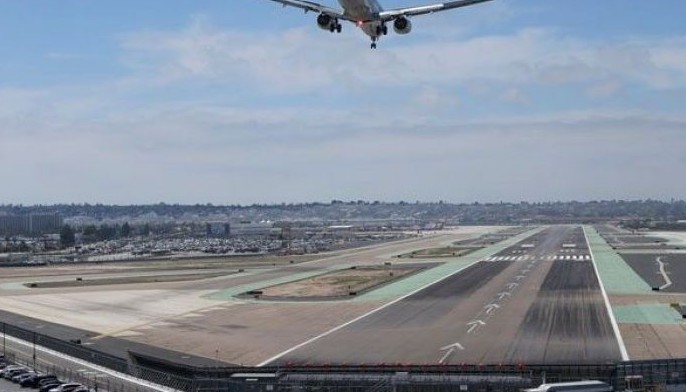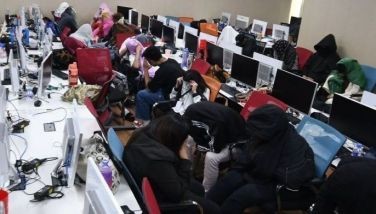Senate minority wants probe into Chinese planes in Davao, Chinese shows on PTV

MANILA, Philippines — Members of the Senate minority have filed resolutions seeking an inquiry on the presence of Chinese military aircraft in Philippine airspace, as well as the airing of Chinese shows on state-run PTV.
Senate Minority Leader Franklin Drilon and Sens. Leila de Lima, Bam Aquino, Risa Hontiveros, Francis Pangilinan, Antonio Trillanes IV have called for an inquiry into Chinese military aircraft landing in Davao City last month.
Senate Resolution 779 seeks to enact measures "that strengthen national security and safeguard the territorial integrity of the country."
It has been reported that a Chinese military plane landed at the Davao City International Airport on June 8 to refuel before heading to Australia. On June 24, another Chinese aircraft landed and refueled again in President Rodrigo Duterte's hometown.
These moves were allowed by the Philippine government, with the assurance of presidential spokesperson Harry Roque that necessary protocols were followed in the "technical" stops of the foreign aircraft.
The resolution, however, noted that the Philippines does not have a treaty with China for logistical support, supplies and services between military forces.
The Philippines has existing agreements with Australia and the United States through the Status of Visiting Forces Agreement and Mutual Logistics Agreement, respectively.
The resolution also noted that the military had no other information about the Chinese plane's presence in the country except for its refurbishment.
"Whereas, the successive occurrence of Chinese military planes making 'technical' stops in Davao City raises the question of whether or not the Constitution's proscription against the presence of foreign troops in the country unless covered b a treaty duly ratified by the Senate is being violated by the Duterte administration," the Senate resolution read.
The senators also raised concerns about speculations that the Chinese military's use of facilities in Davao City was a personal favor that Duterte granted to China without the Armed Forces of the Philippines' knowledge.
Chinese shows on state TV
Meanwhile, Senate Resolution 780 directs the committee on public information and mass media to look into the propriety of the airing of Chinese shows on state-run television network PTV.
The senate minority warned that airing Chinese shows on state-run network poses a danger of spreading Chinese propaganda through the government's official media stations.
"Whereas, airing of Chinese shows in a State-run network may represent an insidious agenda of subtly inculcating among Filipino viewers propaganda on the Chinese Communist Party and its authoritarian one-party state, anti-democtratic, and atheirst ideology and principles, thus countering and possibly ultimately destroying the Filipino's democratic, pro-people, and religious culture and identity," the resolution read.
The minority senators also warned on the clear and present danger of Chinese domination in the country given the latter's incursion of the West Philippine Sea, in addition to the airing of Chinese government propaganda on PTV.
"It is incumbent upon the government to shield the broadcast industry from any form of intrusive and invasive foreign agenda of domination, control and brainwashing of the Filipino people," the resolution read.
Last month, Chinese Ambassador to the Philippines Zhao Jianhua led the launching of the "China TV Theatre" which supposedly seeks to help Filipinos understand China better in terms of their history and culture.
The Chinese envoy said that Chinese shows on the Philippine government's channel would "inspire" Filipinos and help them learn how Bejing attained "steady economic growth."
PTV General Manager Dino Apolonio said that the program would contribute to challenge the Filipino people's minds and promote creativity and imagination.
"China Theatre is contributing immensely in that regard. It serves as a tool for deeper understanding betwen our two peoples," Apolonio said at the launch.
Presidential Communications Secretary Martin Andanar announced at the same event then that there would be a media exchange program with China.
"We all know that the Xinhua News Agency is one of the most successful news agencies in the world and the CCTV is also one of the largest broadcasting networks in the world; China Radio International also," Andanar said in April.
China, however, is one of the most restrictive countries on media and censorship, according to Freedom House.
- Latest
- Trending
































